Analysis of Taxation Case Studies: Residential Status and Sales
VerifiedAdded on 2020/01/28
|8
|2500
|33
Case Study
AI Summary
This assignment presents a detailed analysis of two case studies related to Australian taxation. The first case examines the residential status of an individual, Kit, and its implications for income tax liability, considering his citizenship, employment, and income sources, including salary and dividend income. The second case study involves a series of court cases concerning land sales and capital gains tax, including Californian Copper Syndicate Ltd v Harris, Scottish Australian Mining Co ltd v FC of T, Federal Commissioner of Taxation v. Whitfords Beach Pty. Ltd., Statham & Anor v FC of T, Casimaty v FC of T, Moana Sand Pty Ltd v FC of T, and Crow v FC of T. The analysis explores the factors considered by the courts in determining whether profits from land sales are taxable, focusing on the intentions of the taxpayers, the nature of their activities, and the applicability of relevant tax laws. The document provides insights into how the Australian taxation system operates in relation to residential status, income, and capital gains from property transactions.
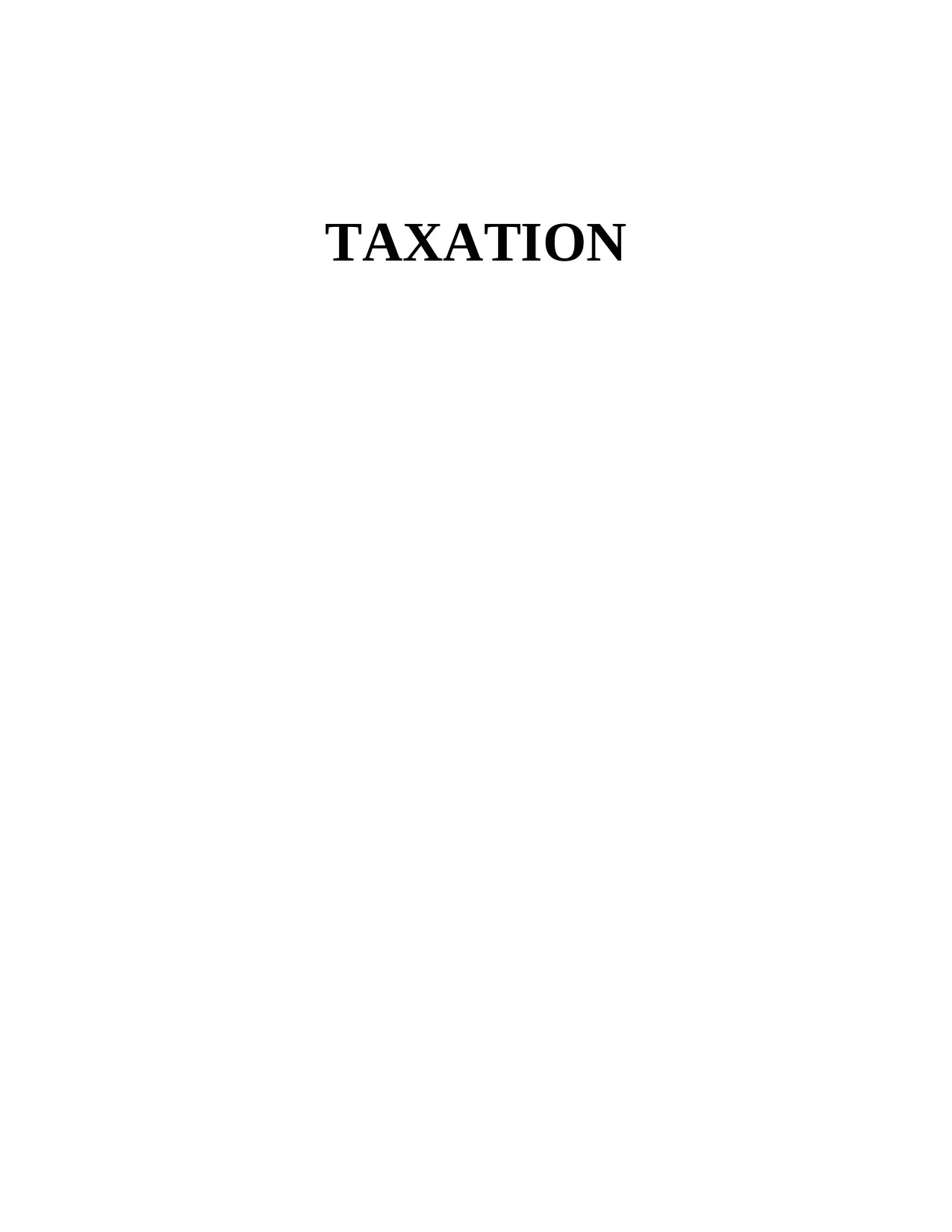
TAXATION
Paraphrase This Document
Need a fresh take? Get an instant paraphrase of this document with our AI Paraphraser
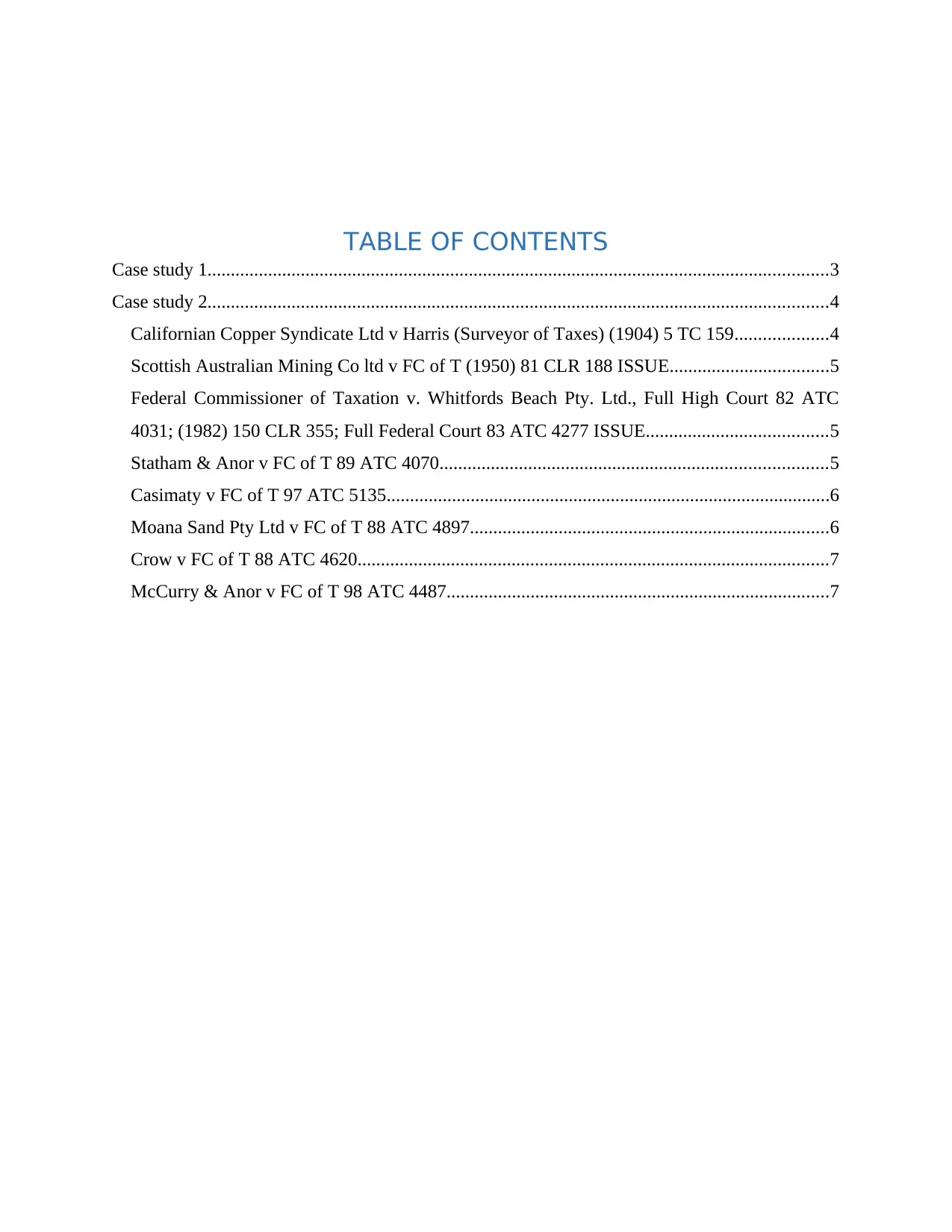
TABLE OF CONTENTS
Case study 1.....................................................................................................................................3
Case study 2.....................................................................................................................................4
Californian Copper Syndicate Ltd v Harris (Surveyor of Taxes) (1904) 5 TC 159....................4
Scottish Australian Mining Co ltd v FC of T (1950) 81 CLR 188 ISSUE..................................5
Federal Commissioner of Taxation v. Whitfords Beach Pty. Ltd., Full High Court 82 ATC
4031; (1982) 150 CLR 355; Full Federal Court 83 ATC 4277 ISSUE.......................................5
Statham & Anor v FC of T 89 ATC 4070...................................................................................5
Casimaty v FC of T 97 ATC 5135...............................................................................................6
Moana Sand Pty Ltd v FC of T 88 ATC 4897.............................................................................6
Crow v FC of T 88 ATC 4620.....................................................................................................7
McCurry & Anor v FC of T 98 ATC 4487..................................................................................7
Case study 1.....................................................................................................................................3
Case study 2.....................................................................................................................................4
Californian Copper Syndicate Ltd v Harris (Surveyor of Taxes) (1904) 5 TC 159....................4
Scottish Australian Mining Co ltd v FC of T (1950) 81 CLR 188 ISSUE..................................5
Federal Commissioner of Taxation v. Whitfords Beach Pty. Ltd., Full High Court 82 ATC
4031; (1982) 150 CLR 355; Full Federal Court 83 ATC 4277 ISSUE.......................................5
Statham & Anor v FC of T 89 ATC 4070...................................................................................5
Casimaty v FC of T 97 ATC 5135...............................................................................................6
Moana Sand Pty Ltd v FC of T 88 ATC 4897.............................................................................6
Crow v FC of T 88 ATC 4620.....................................................................................................7
McCurry & Anor v FC of T 98 ATC 4487..................................................................................7
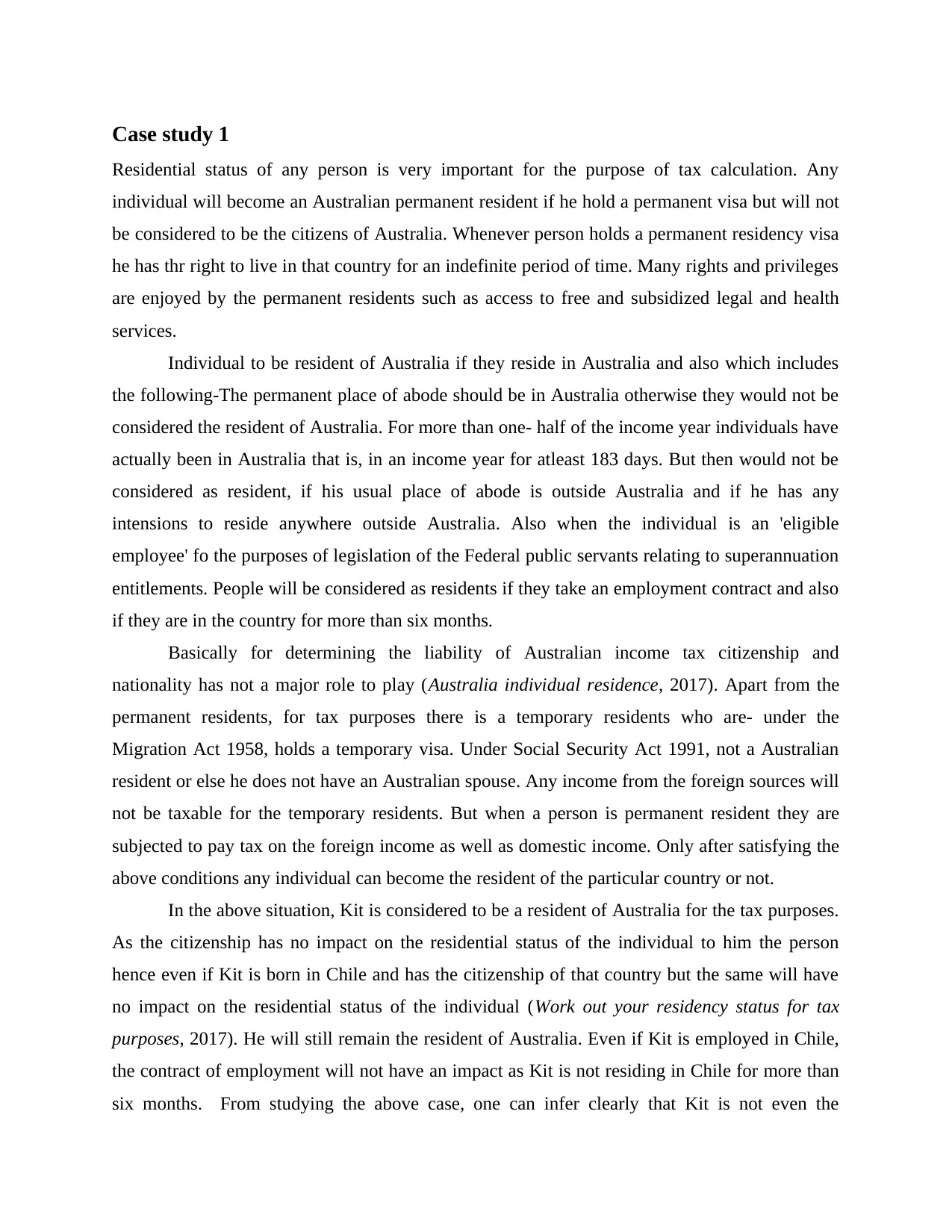
Case study 1
Residential status of any person is very important for the purpose of tax calculation. Any
individual will become an Australian permanent resident if he hold a permanent visa but will not
be considered to be the citizens of Australia. Whenever person holds a permanent residency visa
he has thr right to live in that country for an indefinite period of time. Many rights and privileges
are enjoyed by the permanent residents such as access to free and subsidized legal and health
services.
Individual to be resident of Australia if they reside in Australia and also which includes
the following-The permanent place of abode should be in Australia otherwise they would not be
considered the resident of Australia. For more than one- half of the income year individuals have
actually been in Australia that is, in an income year for atleast 183 days. But then would not be
considered as resident, if his usual place of abode is outside Australia and if he has any
intensions to reside anywhere outside Australia. Also when the individual is an 'eligible
employee' fo the purposes of legislation of the Federal public servants relating to superannuation
entitlements. People will be considered as residents if they take an employment contract and also
if they are in the country for more than six months.
Basically for determining the liability of Australian income tax citizenship and
nationality has not a major role to play (Australia individual residence, 2017). Apart from the
permanent residents, for tax purposes there is a temporary residents who are- under the
Migration Act 1958, holds a temporary visa. Under Social Security Act 1991, not a Australian
resident or else he does not have an Australian spouse. Any income from the foreign sources will
not be taxable for the temporary residents. But when a person is permanent resident they are
subjected to pay tax on the foreign income as well as domestic income. Only after satisfying the
above conditions any individual can become the resident of the particular country or not.
In the above situation, Kit is considered to be a resident of Australia for the tax purposes.
As the citizenship has no impact on the residential status of the individual to him the person
hence even if Kit is born in Chile and has the citizenship of that country but the same will have
no impact on the residential status of the individual (Work out your residency status for tax
purposes, 2017). He will still remain the resident of Australia. Even if Kit is employed in Chile,
the contract of employment will not have an impact as Kit is not residing in Chile for more than
six months. From studying the above case, one can infer clearly that Kit is not even the
Residential status of any person is very important for the purpose of tax calculation. Any
individual will become an Australian permanent resident if he hold a permanent visa but will not
be considered to be the citizens of Australia. Whenever person holds a permanent residency visa
he has thr right to live in that country for an indefinite period of time. Many rights and privileges
are enjoyed by the permanent residents such as access to free and subsidized legal and health
services.
Individual to be resident of Australia if they reside in Australia and also which includes
the following-The permanent place of abode should be in Australia otherwise they would not be
considered the resident of Australia. For more than one- half of the income year individuals have
actually been in Australia that is, in an income year for atleast 183 days. But then would not be
considered as resident, if his usual place of abode is outside Australia and if he has any
intensions to reside anywhere outside Australia. Also when the individual is an 'eligible
employee' fo the purposes of legislation of the Federal public servants relating to superannuation
entitlements. People will be considered as residents if they take an employment contract and also
if they are in the country for more than six months.
Basically for determining the liability of Australian income tax citizenship and
nationality has not a major role to play (Australia individual residence, 2017). Apart from the
permanent residents, for tax purposes there is a temporary residents who are- under the
Migration Act 1958, holds a temporary visa. Under Social Security Act 1991, not a Australian
resident or else he does not have an Australian spouse. Any income from the foreign sources will
not be taxable for the temporary residents. But when a person is permanent resident they are
subjected to pay tax on the foreign income as well as domestic income. Only after satisfying the
above conditions any individual can become the resident of the particular country or not.
In the above situation, Kit is considered to be a resident of Australia for the tax purposes.
As the citizenship has no impact on the residential status of the individual to him the person
hence even if Kit is born in Chile and has the citizenship of that country but the same will have
no impact on the residential status of the individual (Work out your residency status for tax
purposes, 2017). He will still remain the resident of Australia. Even if Kit is employed in Chile,
the contract of employment will not have an impact as Kit is not residing in Chile for more than
six months. From studying the above case, one can infer clearly that Kit is not even the
⊘ This is a preview!⊘
Do you want full access?
Subscribe today to unlock all pages.

Trusted by 1+ million students worldwide
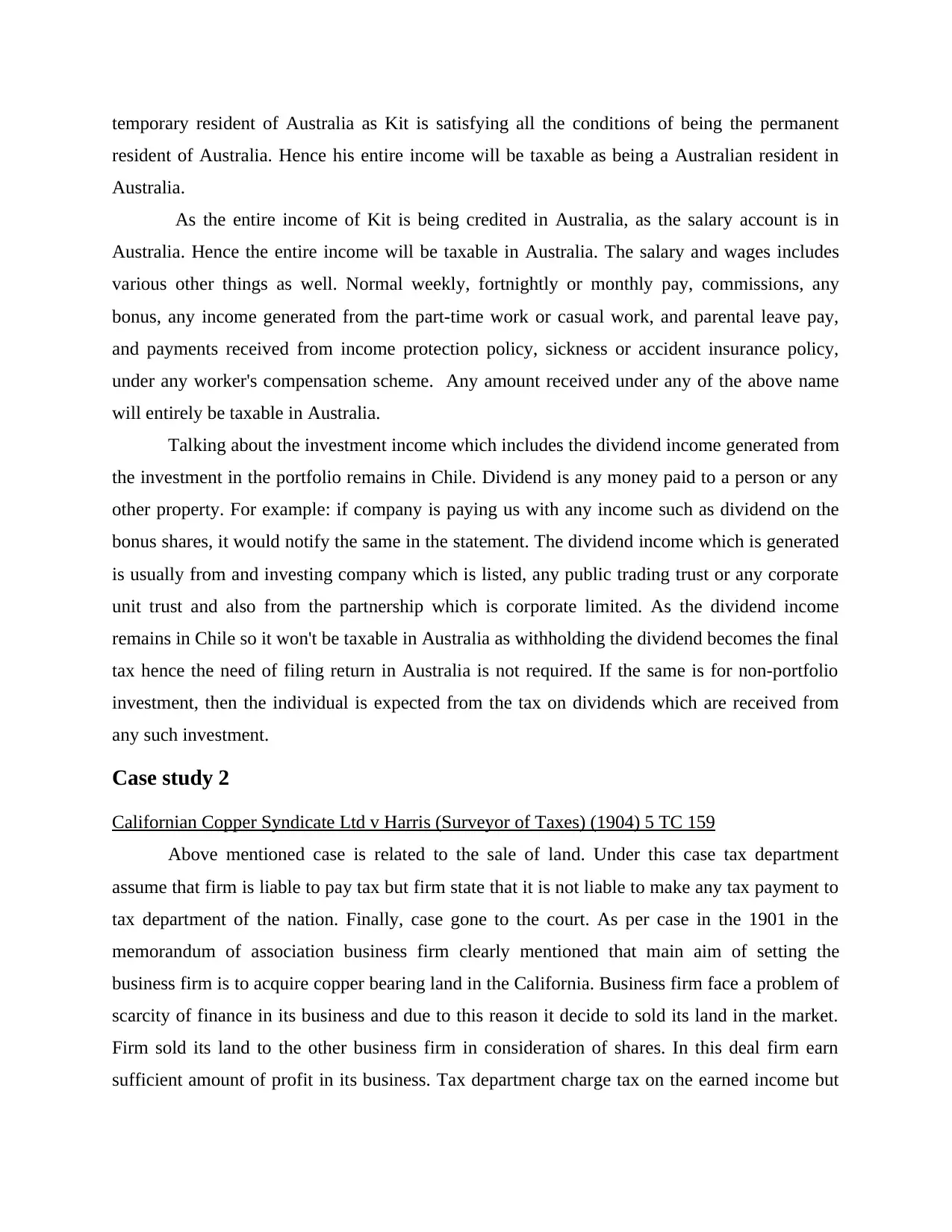
temporary resident of Australia as Kit is satisfying all the conditions of being the permanent
resident of Australia. Hence his entire income will be taxable as being a Australian resident in
Australia.
As the entire income of Kit is being credited in Australia, as the salary account is in
Australia. Hence the entire income will be taxable in Australia. The salary and wages includes
various other things as well. Normal weekly, fortnightly or monthly pay, commissions, any
bonus, any income generated from the part-time work or casual work, and parental leave pay,
and payments received from income protection policy, sickness or accident insurance policy,
under any worker's compensation scheme. Any amount received under any of the above name
will entirely be taxable in Australia.
Talking about the investment income which includes the dividend income generated from
the investment in the portfolio remains in Chile. Dividend is any money paid to a person or any
other property. For example: if company is paying us with any income such as dividend on the
bonus shares, it would notify the same in the statement. The dividend income which is generated
is usually from and investing company which is listed, any public trading trust or any corporate
unit trust and also from the partnership which is corporate limited. As the dividend income
remains in Chile so it won't be taxable in Australia as withholding the dividend becomes the final
tax hence the need of filing return in Australia is not required. If the same is for non-portfolio
investment, then the individual is expected from the tax on dividends which are received from
any such investment.
Case study 2
Californian Copper Syndicate Ltd v Harris (Surveyor of Taxes) (1904) 5 TC 159
Above mentioned case is related to the sale of land. Under this case tax department
assume that firm is liable to pay tax but firm state that it is not liable to make any tax payment to
tax department of the nation. Finally, case gone to the court. As per case in the 1901 in the
memorandum of association business firm clearly mentioned that main aim of setting the
business firm is to acquire copper bearing land in the California. Business firm face a problem of
scarcity of finance in its business and due to this reason it decide to sold its land in the market.
Firm sold its land to the other business firm in consideration of shares. In this deal firm earn
sufficient amount of profit in its business. Tax department charge tax on the earned income but
resident of Australia. Hence his entire income will be taxable as being a Australian resident in
Australia.
As the entire income of Kit is being credited in Australia, as the salary account is in
Australia. Hence the entire income will be taxable in Australia. The salary and wages includes
various other things as well. Normal weekly, fortnightly or monthly pay, commissions, any
bonus, any income generated from the part-time work or casual work, and parental leave pay,
and payments received from income protection policy, sickness or accident insurance policy,
under any worker's compensation scheme. Any amount received under any of the above name
will entirely be taxable in Australia.
Talking about the investment income which includes the dividend income generated from
the investment in the portfolio remains in Chile. Dividend is any money paid to a person or any
other property. For example: if company is paying us with any income such as dividend on the
bonus shares, it would notify the same in the statement. The dividend income which is generated
is usually from and investing company which is listed, any public trading trust or any corporate
unit trust and also from the partnership which is corporate limited. As the dividend income
remains in Chile so it won't be taxable in Australia as withholding the dividend becomes the final
tax hence the need of filing return in Australia is not required. If the same is for non-portfolio
investment, then the individual is expected from the tax on dividends which are received from
any such investment.
Case study 2
Californian Copper Syndicate Ltd v Harris (Surveyor of Taxes) (1904) 5 TC 159
Above mentioned case is related to the sale of land. Under this case tax department
assume that firm is liable to pay tax but firm state that it is not liable to make any tax payment to
tax department of the nation. Finally, case gone to the court. As per case in the 1901 in the
memorandum of association business firm clearly mentioned that main aim of setting the
business firm is to acquire copper bearing land in the California. Business firm face a problem of
scarcity of finance in its business and due to this reason it decide to sold its land in the market.
Firm sold its land to the other business firm in consideration of shares. In this deal firm earn
sufficient amount of profit in its business. Tax department charge tax on the earned income but
Paraphrase This Document
Need a fresh take? Get an instant paraphrase of this document with our AI Paraphraser
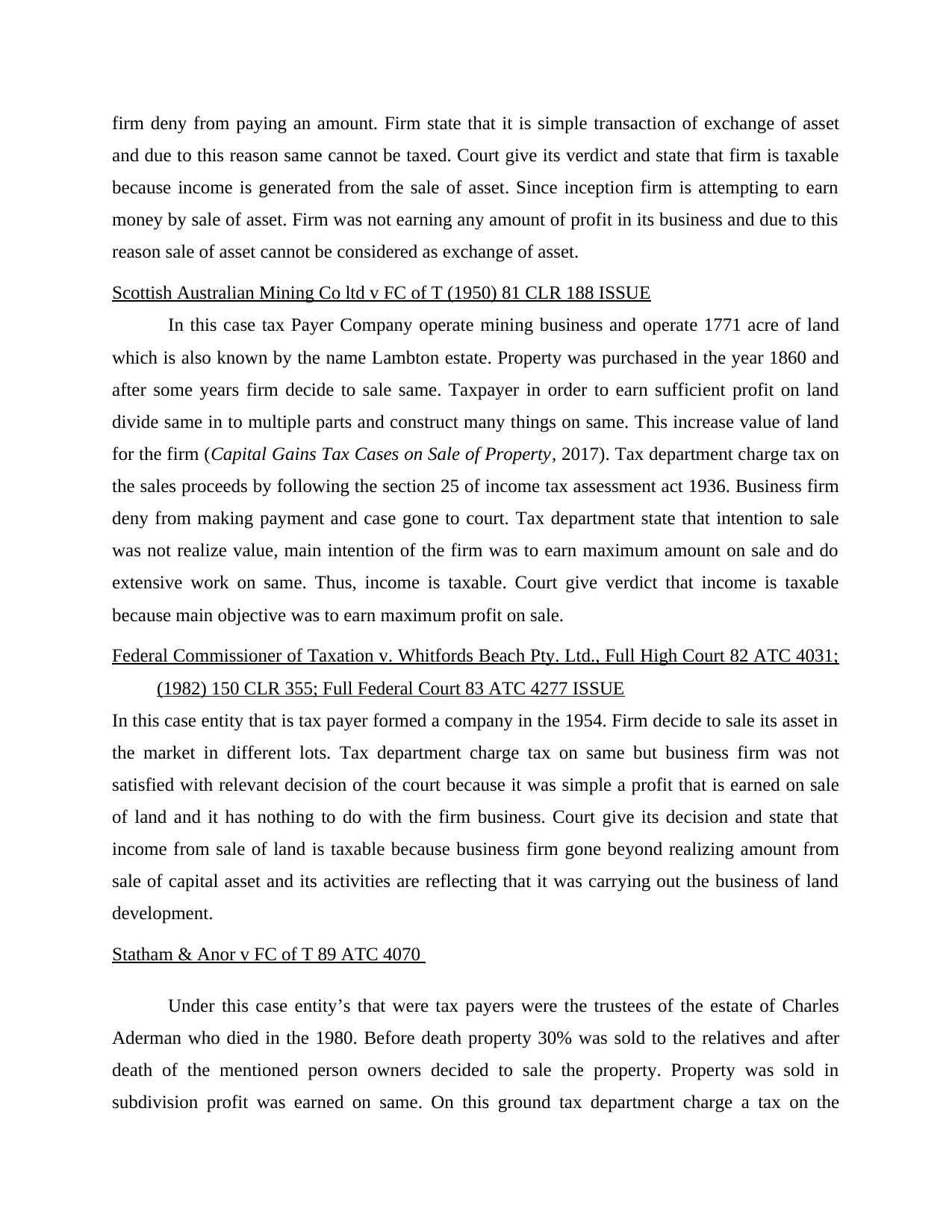
firm deny from paying an amount. Firm state that it is simple transaction of exchange of asset
and due to this reason same cannot be taxed. Court give its verdict and state that firm is taxable
because income is generated from the sale of asset. Since inception firm is attempting to earn
money by sale of asset. Firm was not earning any amount of profit in its business and due to this
reason sale of asset cannot be considered as exchange of asset.
Scottish Australian Mining Co ltd v FC of T (1950) 81 CLR 188 ISSUE
In this case tax Payer Company operate mining business and operate 1771 acre of land
which is also known by the name Lambton estate. Property was purchased in the year 1860 and
after some years firm decide to sale same. Taxpayer in order to earn sufficient profit on land
divide same in to multiple parts and construct many things on same. This increase value of land
for the firm (Capital Gains Tax Cases on Sale of Property, 2017). Tax department charge tax on
the sales proceeds by following the section 25 of income tax assessment act 1936. Business firm
deny from making payment and case gone to court. Tax department state that intention to sale
was not realize value, main intention of the firm was to earn maximum amount on sale and do
extensive work on same. Thus, income is taxable. Court give verdict that income is taxable
because main objective was to earn maximum profit on sale.
Federal Commissioner of Taxation v. Whitfords Beach Pty. Ltd., Full High Court 82 ATC 4031;
(1982) 150 CLR 355; Full Federal Court 83 ATC 4277 ISSUE
In this case entity that is tax payer formed a company in the 1954. Firm decide to sale its asset in
the market in different lots. Tax department charge tax on same but business firm was not
satisfied with relevant decision of the court because it was simple a profit that is earned on sale
of land and it has nothing to do with the firm business. Court give its decision and state that
income from sale of land is taxable because business firm gone beyond realizing amount from
sale of capital asset and its activities are reflecting that it was carrying out the business of land
development.
Statham & Anor v FC of T 89 ATC 4070
Under this case entity’s that were tax payers were the trustees of the estate of Charles
Aderman who died in the 1980. Before death property 30% was sold to the relatives and after
death of the mentioned person owners decided to sale the property. Property was sold in
subdivision profit was earned on same. On this ground tax department charge a tax on the
and due to this reason same cannot be taxed. Court give its verdict and state that firm is taxable
because income is generated from the sale of asset. Since inception firm is attempting to earn
money by sale of asset. Firm was not earning any amount of profit in its business and due to this
reason sale of asset cannot be considered as exchange of asset.
Scottish Australian Mining Co ltd v FC of T (1950) 81 CLR 188 ISSUE
In this case tax Payer Company operate mining business and operate 1771 acre of land
which is also known by the name Lambton estate. Property was purchased in the year 1860 and
after some years firm decide to sale same. Taxpayer in order to earn sufficient profit on land
divide same in to multiple parts and construct many things on same. This increase value of land
for the firm (Capital Gains Tax Cases on Sale of Property, 2017). Tax department charge tax on
the sales proceeds by following the section 25 of income tax assessment act 1936. Business firm
deny from making payment and case gone to court. Tax department state that intention to sale
was not realize value, main intention of the firm was to earn maximum amount on sale and do
extensive work on same. Thus, income is taxable. Court give verdict that income is taxable
because main objective was to earn maximum profit on sale.
Federal Commissioner of Taxation v. Whitfords Beach Pty. Ltd., Full High Court 82 ATC 4031;
(1982) 150 CLR 355; Full Federal Court 83 ATC 4277 ISSUE
In this case entity that is tax payer formed a company in the 1954. Firm decide to sale its asset in
the market in different lots. Tax department charge tax on same but business firm was not
satisfied with relevant decision of the court because it was simple a profit that is earned on sale
of land and it has nothing to do with the firm business. Court give its decision and state that
income from sale of land is taxable because business firm gone beyond realizing amount from
sale of capital asset and its activities are reflecting that it was carrying out the business of land
development.
Statham & Anor v FC of T 89 ATC 4070
Under this case entity’s that were tax payers were the trustees of the estate of Charles
Aderman who died in the 1980. Before death property 30% was sold to the relatives and after
death of the mentioned person owners decided to sale the property. Property was sold in
subdivision profit was earned on same. On this ground tax department charge a tax on the
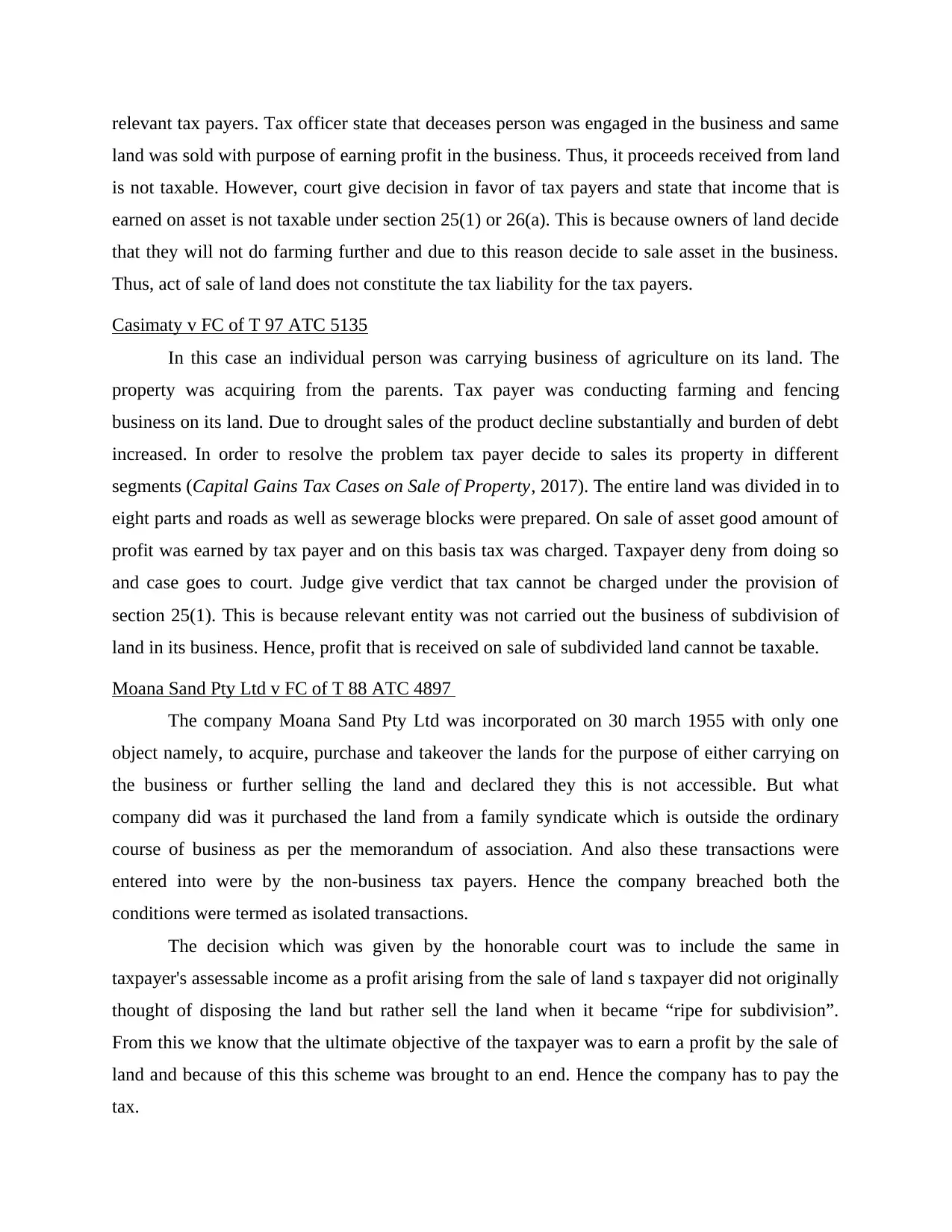
relevant tax payers. Tax officer state that deceases person was engaged in the business and same
land was sold with purpose of earning profit in the business. Thus, it proceeds received from land
is not taxable. However, court give decision in favor of tax payers and state that income that is
earned on asset is not taxable under section 25(1) or 26(a). This is because owners of land decide
that they will not do farming further and due to this reason decide to sale asset in the business.
Thus, act of sale of land does not constitute the tax liability for the tax payers.
Casimaty v FC of T 97 ATC 5135
In this case an individual person was carrying business of agriculture on its land. The
property was acquiring from the parents. Tax payer was conducting farming and fencing
business on its land. Due to drought sales of the product decline substantially and burden of debt
increased. In order to resolve the problem tax payer decide to sales its property in different
segments (Capital Gains Tax Cases on Sale of Property, 2017). The entire land was divided in to
eight parts and roads as well as sewerage blocks were prepared. On sale of asset good amount of
profit was earned by tax payer and on this basis tax was charged. Taxpayer deny from doing so
and case goes to court. Judge give verdict that tax cannot be charged under the provision of
section 25(1). This is because relevant entity was not carried out the business of subdivision of
land in its business. Hence, profit that is received on sale of subdivided land cannot be taxable.
Moana Sand Pty Ltd v FC of T 88 ATC 4897
The company Moana Sand Pty Ltd was incorporated on 30 march 1955 with only one
object namely, to acquire, purchase and takeover the lands for the purpose of either carrying on
the business or further selling the land and declared they this is not accessible. But what
company did was it purchased the land from a family syndicate which is outside the ordinary
course of business as per the memorandum of association. And also these transactions were
entered into were by the non-business tax payers. Hence the company breached both the
conditions were termed as isolated transactions.
The decision which was given by the honorable court was to include the same in
taxpayer's assessable income as a profit arising from the sale of land s taxpayer did not originally
thought of disposing the land but rather sell the land when it became “ripe for subdivision”.
From this we know that the ultimate objective of the taxpayer was to earn a profit by the sale of
land and because of this this scheme was brought to an end. Hence the company has to pay the
tax.
land was sold with purpose of earning profit in the business. Thus, it proceeds received from land
is not taxable. However, court give decision in favor of tax payers and state that income that is
earned on asset is not taxable under section 25(1) or 26(a). This is because owners of land decide
that they will not do farming further and due to this reason decide to sale asset in the business.
Thus, act of sale of land does not constitute the tax liability for the tax payers.
Casimaty v FC of T 97 ATC 5135
In this case an individual person was carrying business of agriculture on its land. The
property was acquiring from the parents. Tax payer was conducting farming and fencing
business on its land. Due to drought sales of the product decline substantially and burden of debt
increased. In order to resolve the problem tax payer decide to sales its property in different
segments (Capital Gains Tax Cases on Sale of Property, 2017). The entire land was divided in to
eight parts and roads as well as sewerage blocks were prepared. On sale of asset good amount of
profit was earned by tax payer and on this basis tax was charged. Taxpayer deny from doing so
and case goes to court. Judge give verdict that tax cannot be charged under the provision of
section 25(1). This is because relevant entity was not carried out the business of subdivision of
land in its business. Hence, profit that is received on sale of subdivided land cannot be taxable.
Moana Sand Pty Ltd v FC of T 88 ATC 4897
The company Moana Sand Pty Ltd was incorporated on 30 march 1955 with only one
object namely, to acquire, purchase and takeover the lands for the purpose of either carrying on
the business or further selling the land and declared they this is not accessible. But what
company did was it purchased the land from a family syndicate which is outside the ordinary
course of business as per the memorandum of association. And also these transactions were
entered into were by the non-business tax payers. Hence the company breached both the
conditions were termed as isolated transactions.
The decision which was given by the honorable court was to include the same in
taxpayer's assessable income as a profit arising from the sale of land s taxpayer did not originally
thought of disposing the land but rather sell the land when it became “ripe for subdivision”.
From this we know that the ultimate objective of the taxpayer was to earn a profit by the sale of
land and because of this this scheme was brought to an end. Hence the company has to pay the
tax.
⊘ This is a preview!⊘
Do you want full access?
Subscribe today to unlock all pages.

Trusted by 1+ million students worldwide
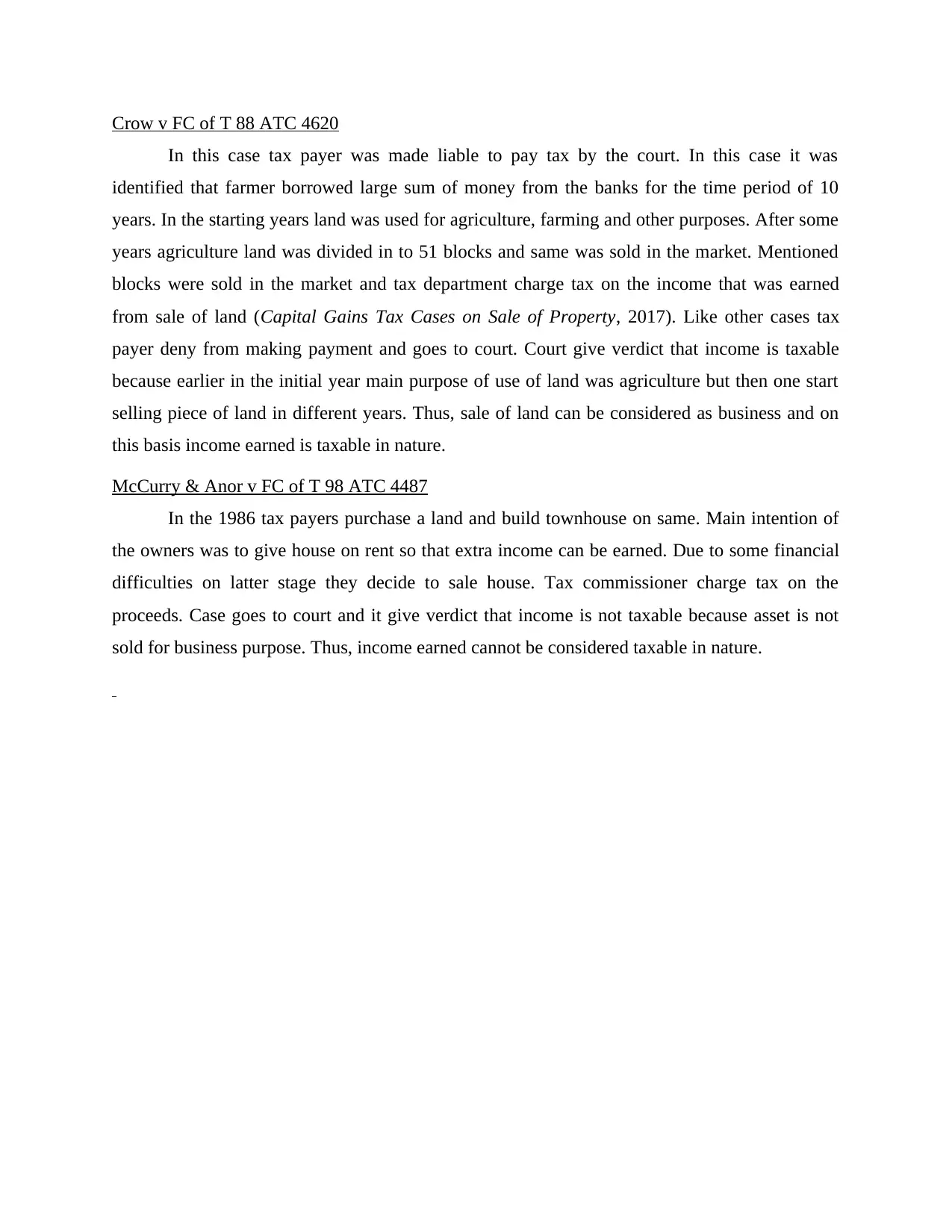
Crow v FC of T 88 ATC 4620
In this case tax payer was made liable to pay tax by the court. In this case it was
identified that farmer borrowed large sum of money from the banks for the time period of 10
years. In the starting years land was used for agriculture, farming and other purposes. After some
years agriculture land was divided in to 51 blocks and same was sold in the market. Mentioned
blocks were sold in the market and tax department charge tax on the income that was earned
from sale of land (Capital Gains Tax Cases on Sale of Property, 2017). Like other cases tax
payer deny from making payment and goes to court. Court give verdict that income is taxable
because earlier in the initial year main purpose of use of land was agriculture but then one start
selling piece of land in different years. Thus, sale of land can be considered as business and on
this basis income earned is taxable in nature.
McCurry & Anor v FC of T 98 ATC 4487
In the 1986 tax payers purchase a land and build townhouse on same. Main intention of
the owners was to give house on rent so that extra income can be earned. Due to some financial
difficulties on latter stage they decide to sale house. Tax commissioner charge tax on the
proceeds. Case goes to court and it give verdict that income is not taxable because asset is not
sold for business purpose. Thus, income earned cannot be considered taxable in nature.
In this case tax payer was made liable to pay tax by the court. In this case it was
identified that farmer borrowed large sum of money from the banks for the time period of 10
years. In the starting years land was used for agriculture, farming and other purposes. After some
years agriculture land was divided in to 51 blocks and same was sold in the market. Mentioned
blocks were sold in the market and tax department charge tax on the income that was earned
from sale of land (Capital Gains Tax Cases on Sale of Property, 2017). Like other cases tax
payer deny from making payment and goes to court. Court give verdict that income is taxable
because earlier in the initial year main purpose of use of land was agriculture but then one start
selling piece of land in different years. Thus, sale of land can be considered as business and on
this basis income earned is taxable in nature.
McCurry & Anor v FC of T 98 ATC 4487
In the 1986 tax payers purchase a land and build townhouse on same. Main intention of
the owners was to give house on rent so that extra income can be earned. Due to some financial
difficulties on latter stage they decide to sale house. Tax commissioner charge tax on the
proceeds. Case goes to court and it give verdict that income is not taxable because asset is not
sold for business purpose. Thus, income earned cannot be considered taxable in nature.
Paraphrase This Document
Need a fresh take? Get an instant paraphrase of this document with our AI Paraphraser
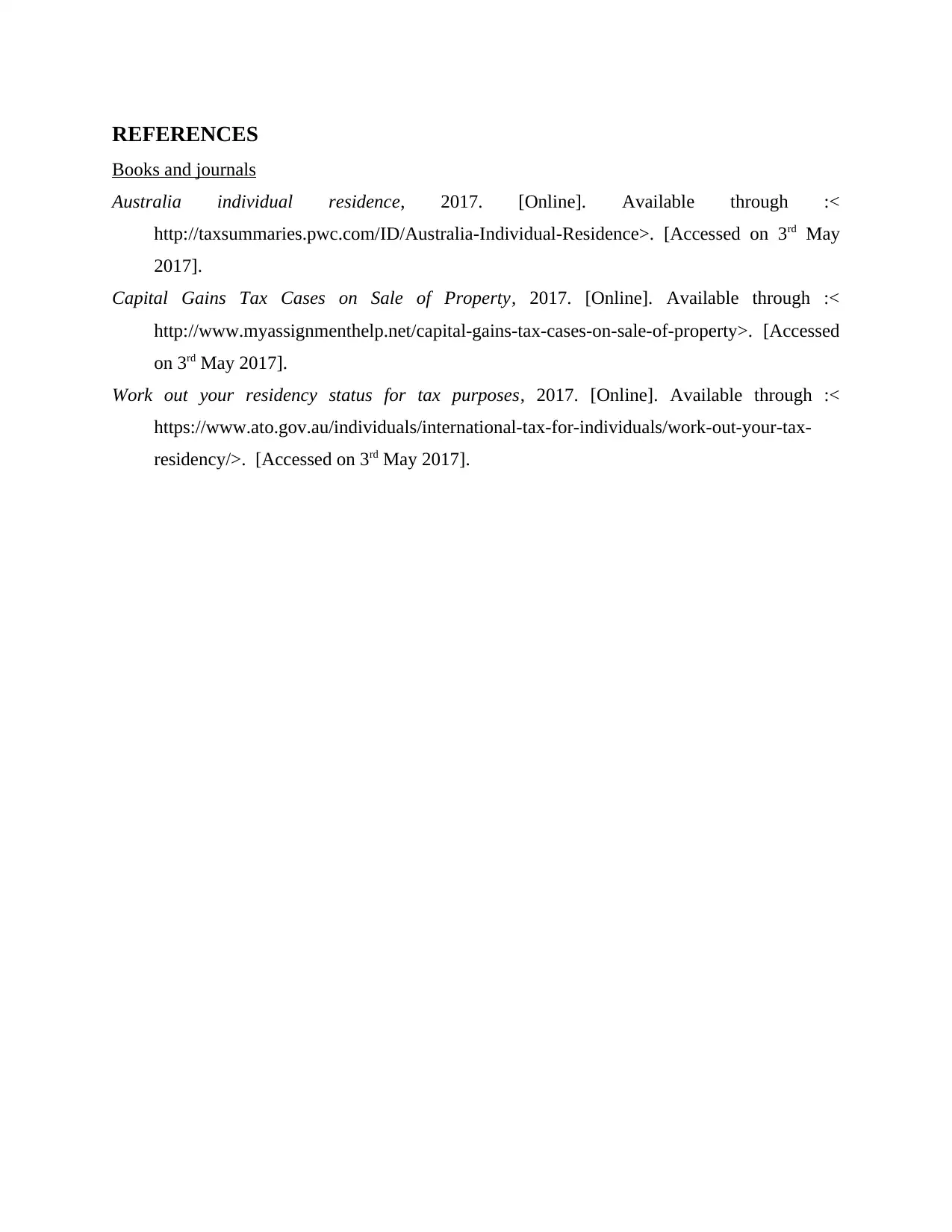
REFERENCES
Books and journals
Australia individual residence, 2017. [Online]. Available through :<
http://taxsummaries.pwc.com/ID/Australia-Individual-Residence>. [Accessed on 3rd May
2017].
Capital Gains Tax Cases on Sale of Property, 2017. [Online]. Available through :<
http://www.myassignmenthelp.net/capital-gains-tax-cases-on-sale-of-property>. [Accessed
on 3rd May 2017].
Work out your residency status for tax purposes, 2017. [Online]. Available through :<
https://www.ato.gov.au/individuals/international-tax-for-individuals/work-out-your-tax-
residency/>. [Accessed on 3rd May 2017].
Books and journals
Australia individual residence, 2017. [Online]. Available through :<
http://taxsummaries.pwc.com/ID/Australia-Individual-Residence>. [Accessed on 3rd May
2017].
Capital Gains Tax Cases on Sale of Property, 2017. [Online]. Available through :<
http://www.myassignmenthelp.net/capital-gains-tax-cases-on-sale-of-property>. [Accessed
on 3rd May 2017].
Work out your residency status for tax purposes, 2017. [Online]. Available through :<
https://www.ato.gov.au/individuals/international-tax-for-individuals/work-out-your-tax-
residency/>. [Accessed on 3rd May 2017].
1 out of 8
Related Documents
Your All-in-One AI-Powered Toolkit for Academic Success.
+13062052269
info@desklib.com
Available 24*7 on WhatsApp / Email
![[object Object]](/_next/static/media/star-bottom.7253800d.svg)
Unlock your academic potential
Copyright © 2020–2026 A2Z Services. All Rights Reserved. Developed and managed by ZUCOL.





